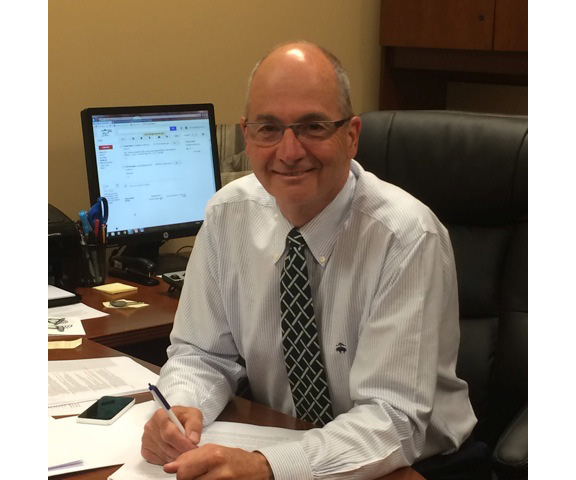 Robert “Bob” Payne, principal at Highland Christian School, has been in the education system for 35 years. Throughout the lessons taught and lessons learned, he has found the key of which students will need for any route in life: preparedness.
Robert “Bob” Payne, principal at Highland Christian School, has been in the education system for 35 years. Throughout the lessons taught and lessons learned, he has found the key of which students will need for any route in life: preparedness.
“I am not responsible for the choices you make,” Payne tells his students. “But I am responsible for the choices you have.”
Payne's philosophy is centered around the idea that students should leave school with the skills to pursue anything they want out of life. Payne started his career as a high school social studies teacher, and from there moved up through different administration roles. The intention in high school is to prepare teens for college, but Payne realized that without first being prepared for high school, kids could not succeed.
They need to be on track for college by fifth grade. Earlier is even better, says Payne..
Statistics show that 50% of science and math majors end up switching to something else when the material gets too difficult. Payne wants his students to be in the 50% that stay.
Kids decide early on that they are bad at science, or math. Payne feels they are losing their enthusiasm because they are not properly engaged, not because they are legitimately bad at it. They are giving up because they were not prepared for the material.
“The traditional way of teaching is just not working,” he said.
So Highland Christian School is trying alternative techniques to get their kids excited about STEM (Science, Technology, Engineering, and Math). They are using Macbooks in every classroom, and will have a one to one ratio by the 2017-2018 school year. Project Lead the Way (PLTW) has been incorporated into their science curriculum. ACT testing shows whether the students are on the right track and where they need to improve.
“The whole idea of STEM is to further technology. Information is instant, and that is the world they live in,” he explained.
Changes like these are giving kids ownership of their own educations. With the Macbooks, they can get more information on what they are learning, they can use connected websites to check on their assignments while they are at home, and their parents can stay informed on what is going on at school.
PLTW gives them a hands-on experience with technology that engages them in a way that a textbook never could.
“If you walk into the classroom, it’s immediately obvious that they’re engaged," explains Payne. They’re working together in a group, the teacher is a facilitator.”
Each PLTW module is a nine week project with a theme. The first one completed by Highland Christian School’s 7th and 8th graders was centere around "Design and Modeling". It is an engineering course that starts with the introduction of the students to a person with cerebral palsy. They are instructed to design a walking brace. Throughout the course they learn drawing, creation, and how to use a 3D printer.
Next year, eighth graders will be doing an Automation and Robotics course while 7th sticks with Design and Modeling, so that every class of students will get to do both.
Payne hopes to add a third module in the years to come.
Schools have changed since Payne was a history teacher. He sees a lot more accountability from the kids, and more of a “every kid matters” attitude from the teachers and administration.
Payne worked at Illinois schools for three decades before retiring early from his job at a Chicago high school. He returned to the educational system as a principal for Highland Christian School. 2016-2017 is his second year there.
Education is not just a job to him, it is in his blood. He reads about leadership in his free time, and volunteers with a group of people from his church to tutor inner-city children. Occasionally, he teaches a class in order to maintain the mindset of what it is like to be in the classroom versus being in a principal’s role.
His daughter also inherited his passion for teaching. She is a middle school Spanish teacher.
“It’s so much fun to be able to talk to her about classrooms and ideas and what she’s doing. It’s very rewarding.”
At Payne’s school, Spanish is taught to middle schoolers as another way to round out their education, prepare them for high school, and get them to think in different ways.
Not every student will want to go to college, but what they learn at Highland Christian School can be applied to any path they choose, whether it is a university or a technical school, or independent entrepreneurship. That is the beauty of being prepared: they can do anything they want, with success.
Payne says it is the perk of teaching at a private school, that they are able to include their faith in their teaching.
“We’re able to work from the philosophical views of our families. We train kids to look at the world through the lens of scripture, and teach from a reformed perspective. Our opportunity is to improve the world," said Payne. "Let’s teach our kids, right now, that they have a purpose. They ask themselves, 'How can my learning make the world a better place?'”